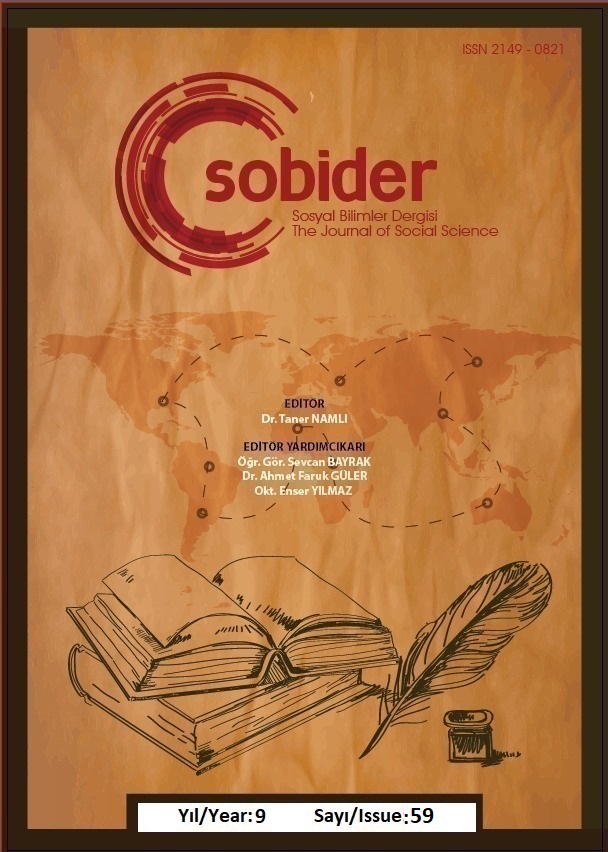Author :
Abstract
Kavramsal tasarım yaklaşımı özellikle 1980’li yıllarda, giyim modası alanında etkinliğini artırmıştır. Bu dönemde Postmodernizmin etkisiyle şekillenen giyim modasında kavramsal yaklaşımlar, toplumsal anlamda kültür, gelenek, inanç, cinsiyet ve kimlik normlarını, bu unsurlar paralelinde oluşan ideolojileri ve sınıflandırmaları sorgulayan bir yapılanmayı beraberinde getirmiştir. Kavramsal yaklaşımlar toplumsal değerler sisteminde giysi-beden ilişkisi üzerine yoğunlaşmış, giysinin anlamı ve işlevselliğini yeniden tanımlayarak temsiliyet değişkenliği yaratmıştır. Bu oluşumda etkili olan moda tasarımcılarını ve tasarımlarında öne çıkan kavramsal içeriklerinin araştırılmasını amaçlayan bu çalışma nitel yöntemle araştırılmış, yorumlayıcı ve betimleyici bir yaklaşım izlenerek hazırlanmıştır. Bu amaç doğrultusunda, çağdaş kavramsal modanın öncü isimleri olan Issey Miyake, Yohji Yamamoto, Rei Kawakubo, Maison Martin Margiela, Hüseyin Çağlayan ve Alexander McQueen’in koleksiyonları incelenmiş, görsellerle desteklenen örneklerin analizleri ve değerlendirmeleri yapılmıştır. Bu çalışmanın sonucunda toplumsal kodlara odaklanan moda tasarımcılarının, felsefi bir konumlandırmayla kavramsal fikirlerini sanatsal anlatımlardan da yararlanarak yorumladıkları görülmüştür. Bu moda tasarımcıları, kavramsal tasarım yaklaşımları ve radikal sunum yöntemleriyle giyim nesnelerini metafor olarak kullanmışlar, moda ve giyim alışkanlıklarıyla ilgili değer yargıları klişelerini yıkmışlardır.
Keywords
Abstract
The conceptual design approach has maximized its efficiency in the field of clothing fashion, especially in the 1980s. In this period, conceptual approaches in clothing fashion, shaped by the influence of Postmodernism, brought with it a structure that questioned culture, tradition, belief, gender and identity norms, ideologies and classifications formed in parallel with these factors. Conceptual approaches focused on the clothing-body relationship within the framework of the social value system, redefining the meaning and functionality of clothing and creating representational variability. This study, which aims to investigate the fashion designers who are influential in this phenomenon and their prominent conceptual contents in terms of their designs, has been researched using a qualitative method and has been prepared by following an interpretive and descriptive approach. For this purpose, the collections of Issey Miyake, Yohji Yamamoto, Rei Kawakubo, Maison Martin Margiela, Hüseyin Çağlayan and Alexander McQueen, who are the leading names of contemporary conceptual fashion, were examined and the samples supported by visuals were analyzed and evaluated. As a result of this study, it has been observed that fashion designers who focus on social codes interpret their conceptual ideas with a philosophical positioning by making use of artistic expressions. These fashion designers have used clothing objects as metaphors with their conceptual design approaches and radical presentation methods, and they have broken down the stereotypes with respect to fashion and clothing habits.
Keywords
- Aktulum, K. (2020). Moda ve Metinlerarasılık Alexander McQueen ve Üstgiysisellik, Çizgi Kitabevi Yayınları, İstanbul.
- Buxbaum, G. (1999). Icons of Fashion The 20th Century, Prestel, New York.
- Borrelli Persson, L. (1992). https://www.vogue.com/fashion-shows/fall-1992-ready-to- wear/comme-des-garcons.html, Erişim tarihi: 25 Haziran 202.
- Cottington, D. (2013). Avangard, Çev. Nursu Örge, Dost Kitabevi, Ankara.
- Demir Parlak, S. (2021). “Çağdaş Japon Moda Tasarımcılarının Batı Modasında Yaratığı Yenilikçi Kavram ve Siluetler” Art&Design-2021, Uluslararası Sanat ve Tasarım Araştırmaları Kongresi ve Sergisi, (Sözlü Bildiri), s. 1672-1687, Niğde Ömer Halisdemir Üniversitesi ve Kayseri Üniversitesi, Online, Niğde, Türkiye. https://drive.google.com/file/d/1RbsXc4NoCPeMr_o7RdCySbrTPqB-rJcq/view.
- English, B. (2013). A Cultural History of Fashion in the 20th and 21st Centuries, Second Edıtıon, Bloomsbury Academic, London.
- Fogg, M. (2014). Modanın Tüm Öyküsü, Çev. E. Gözgü, Hayalperest Yayınevi, İstanbul.
- Fukai, A. (2002) Fashion, Taschen, Italy.
- Fukai, A., Suoh, T., Iwagami, M., Koga, R., Niee, R. (2005). Fashion A History from the 18th to the 20th Century, Taschen, China.
- Handley, S. (1999). Nylon the Story of a Fashion Revelution, The Johns Hopkins University Press, USA.
- Kawamura, Y. (2016). Moda-loji, Çev. Ş. Özüdoğru, Ayrıntı Yayınları, İstanbul.
- Khan, N. (2000). “Catwalk Politics”, Fashion Cultures, Theories, Explorations and Analysis, (Ed.: Bruzzi, S. ve Church Gibson, P.), Rutledge, Londra, İngiltere.
- Kenneddy, A., Stoehrer, E. B., Calderin, J. (2013). Fashion Design, Referenced Rokfort Publisher, China.
- Luna, I. (2014). Yohji Yamamoto, Rizoli International Publications, Italy.
- Mackenzie, M. (2017). …izmler Modayı Anlamak, Çev. M. Tuna, s. 115, 116, Hayalperest Yayınevi, İstanbul.
- Mc Dowell, C. (2000). Fashion Today, Pfaidon Press Lmt., Hong Kong.
- Oakley Smith, M., Kubler, A. (2013) Art/Fashion in the 21st Century, Thames&Hudson, London.
- Özüdoğru, Ş. (2012). “19. Yüzyıldan Günümüze Moda ve Sanat Etkileşimi”, Anadolu Üniversitesi, Fen Bilimleri Enstitüsü, Endüstriyel Sanatlar Anabilim Dalı, Yayımlanmamış Yüksek Lisans Tezi, Eskişehir.
- Renfrew, C., Renfrew, E. (2014). Moda Tasarımında Koleksiyon Geliştirme, Çev. Begüm Başoğlu, Literatür Yayınları, İstanbul.
- P Sanat Kültür, Antika, (1998). “Issey Miyake “Making Things””, Sayı: 12, Kış 98-99, Raffi Portakal Antikacılık Müzayede Organizasyon ve Danışmanlık A.Ş., s. 38-53, İstanbul.
- Sabanuç Gönül, İ., Bağrışen, Y. (2016). “20.yy.dan Günümüze Giyim Tasarımında Deneysel Yaklaşımlar”, İdil, 2016, Cilt 6, Sayı 28, Volume 6, Issue 28, s. 91-105
- Sato, K., Chandes, H. (1999). Issey Miyake, Making Things, Fondation Cartier pour I’Art Contemporian Scalio, Paris.
- Svendsen, L. (2008). “Moda ve Sanat”, Çev. Uran Apak, Sanat Dünyamız, Sayı:107, Yapı Kredi Kültür Sanat Yayıncılık A.Ş., s. 8-13, İstanbul.
- Şahin, T. (2019). “Japon Avangardı Tasarımcısı Rei Kawakubo’nun Comme Des Garçons Koleksiyonlarında Kadının Korku Unsuru Olarak Temsili”, İstanbul Teknik Üniversitesi, Sosyal Bilimler Enstitüsü, Sanat Tarihi Anabilim Dalı, Sanat Tarihi Programı, Yayımlanmamış Yüksek Lisans Tezi, İstanbul.
- Watt, J. (2012). Alexander McQueen The Life and Legacy, Harper Design, United States America.
- Worsley, H. (2018). Modayı Değiştiren 100 Fikir, Çev. Begüm Başoğlu Özer, Literatür Yayınları, İstanbul.





